 The new code system helps verify the authenticity of recent production.
The new code system helps verify the authenticity of recent production. It's a question we get all the time —but a lot more frequently lately since the bombshell news that the United States has taken the first steps toward normalizing relations with Cuba. It's a good question too because, in our experience, there are more fake Cuban cigars floating around the US than real ones. Yet even in countries where Cubans are legal (i.e., The Rest of the World), smokers who turn to the internet instead of trusted brick-and-mortar retailers can fall victim to the same unscrupulous scam artists as Americans do.
First things first though. To our readers in America, it is important to note that Cuban cigars haven't suddenly become legal. Offenders can still be fined or even prosecuted. (Just ask Ken Aretsky, who almost did prison time.) It will take an act of Congress to lift the embargo that has stood since the Kennedy administration. Until then, the only way to purchase Cuban cigars without breaking the law is to travel to Cuba with a valid license and make your purchase in person. (Note that about 99.99% of cigars sold by street vendors there are fake. More on that later.)
Americans are also only allowed to bring back $100 total in alcohol and tobacco products. Even in Havana, where Cuban cigars are about as inexpensively priced as you can get, that means you're hitting your head on the $100 ceiling after a bottle of rum and a handful of Cohibas. That's probably why some Americans will still risk breaking the law to buy Cuban cigars from places like England, Germany, Spain and Switzerland. And sure, sellers in those countries will be happy to take your money, since they're not breaking any laws in their own countries by taking your money. You're breaking the law by giving it to them. And since what you're doing is not legal, you have no legal recourse if you get screwed. Just sayin.'
Wait...Can't I Tell By Looking At The Bands Or Boxes?
Yes, but mostly no. Almost anything can be counterfeited nowadays, including holograms and microprinting. Unless you're extremely experienced, it's very difficult to tell by just looking at a box or single and comparing it to photos of the real thing. Recently, however, the Cubans have gotten much better and have even introduced codes you can enter online to verify a sealed box as authentic. We'll get back to that a little later.
Buying In Person
Okay, now for the rest of the world. Obviously, it's best to stick with buying your cigars in person from a reputable dealer. The official franchise of Habanos SA, the parent company for the Cuban cigar industry, is La Casa del Habano. You can feel safe buying cigars there for the same reason you know you're getting a real Starbucks coffee when you walk into a Starbucks store. They're supplied directly by Habanos SA (or the local authorized distributor for that country) in the same way that any franchisee of any chain of stores is. A word of warning, though. We have heard that in some countries where trademark laws are rarely enforced, stores calling themselves La Casa del Habano do operate selling fake cigars. How can you be sure not to fall prey? Simply check the Casa website before shopping to verify the location you're interested in.
But there are also plenty of mom-and-pop shops that are 100% legit. The vast majority, in fact. And it's easy to find them. Simply visit the Habanos website to find the distributor for your country. Then contact the distributor or visit their website for a list of stores they supply.
And now, thanks to smartphones, it's easy to verify a box of cigars before you take it to the counter. Simply enter the security code here and you will know instantly if what you're holding is authentic because it's traceable right back to the place of manufacture.
Places To Avoid
Anyone selling cigars on the street is suspicious anywhere, but especially in Cuba. The simple fact is that Cuban cigar factories are managed with the same tight security measures as any others. Whole boxes of Cuban cigars are not leaking out onto the street to be sold at a deep discount by larcenous rollers. It simply does not happen—not anymore, anyway. What does happen sometimes though is cigars are rolled from scraps of God knows what at home and placed into boxes constructed with labels stolen from factories. If you want to take your chances and risk your health, be our guests. (More on that later.)
The same goes for cigar stores in tourist traps like Miami, where beach vendors will tell you they have family members in Cuba who smuggle authentic cigars to them in the US. If you want to know why that does not happen, see above. What you'll likely be getting are fakes rolled in Mexico. There is also no ring of smugglers running boat trips at night from cigar stores in Havana to the US. There's a much easier way to make money in that business in America, and it's called opening a legitimate cigar store selling real non-Cuba cigars.
Things get fuzzier in countries where Cuban cigars are legal. Obviously regular consumers of Cuban cigars can tell the difference by smell and taste, in the same way a guy who drinks Glenlivet 12 every night can tell if the bartender slips him a Dewar's instead. But once again, avoid tourist traps. For instance, shops right near where a cruise ship docks are more likely to be suspect than a 50-year-old store in the city's business district.
And always beware of prices that are too good to be true. Cuban cigars only get so inexpensive. In countries like Canada and England, they are in fact very expensive due to draconian government taxation. However, we have seen some sellers who go the opposite way and price their fakes at or way above the going rates. These are typically in tourist traps that see their fair share of suckers. How come? Because if you're only going to get one opportunity to fleece a sucker, might as well get him for as much as you can!
On The Interwebs
It's easy for less tech savvy folks to get scammed by fake luxury goods of all kinds, from North Face jackets to Kate Spade bags...to Cuban cigars. After all, a flashy website selling counterfeit goods can often look more legitimate than a little mom and pop site that really is selling authentic products. Once again, if the prices are too good to be true, run. If the store is also selling rare cigars that most other places have long sold out of, that's another dead giveaway. One more thing: do you think someone selling fake cigars cares about safeguarding your credit card information? Or even stealing it and possibly selling it to another criminal?
But it doesn't have to be so scary. First of all, many (if not most) brick-and-mortar shops also do a brisk mail order business. It's almost unthinkable that the online site of a legitimate brick-and-mortar store would sell fakes of any kind. If you're not sure the website is actually that of the store, simply make a phone call to confirm. Or place your order over the phone while you're at it and bypass the web completely.
Of course, there are plenty of legit dealers who sell via their website only. But once again, it's fairly easy to verify them. Simply contact the distributor in their home region before ordering. But be aware that some of the deep discounters do what they have to do to keep prices low. That means they sometimes bypass normal distribution channels to source their products wherever they can. While this does not necessarily mean the cigars are fakes, it's a suspect practice and can potentially expose the seller to counterfeit or subpar product, even if unknowingly. It's up to you to judge whether the savings are worth the risk.
You may also be subject to import duties and taxes, making it easier and perhaps even cheaper in the long run to simply buy cigars within your home market. Many Canadians take their chances trying to import cigars to avoid the absurdly high taxation there. Unfortunately, most of those folks see their cigars delivered along with a bill for what would otherwise go uncollected.
While you can only do so much before you buy, you can check the security code on the box after receipt by visiting here. That way, you'll know you got the real thing. If you didn't, chances are an unscrupulous seller won't refund your money anyway, but at least you'll know not to smoke them. Here's why...
First things first though. To our readers in America, it is important to note that Cuban cigars haven't suddenly become legal. Offenders can still be fined or even prosecuted. (Just ask Ken Aretsky, who almost did prison time.) It will take an act of Congress to lift the embargo that has stood since the Kennedy administration. Until then, the only way to purchase Cuban cigars without breaking the law is to travel to Cuba with a valid license and make your purchase in person. (Note that about 99.99% of cigars sold by street vendors there are fake. More on that later.)
Americans are also only allowed to bring back $100 total in alcohol and tobacco products. Even in Havana, where Cuban cigars are about as inexpensively priced as you can get, that means you're hitting your head on the $100 ceiling after a bottle of rum and a handful of Cohibas. That's probably why some Americans will still risk breaking the law to buy Cuban cigars from places like England, Germany, Spain and Switzerland. And sure, sellers in those countries will be happy to take your money, since they're not breaking any laws in their own countries by taking your money. You're breaking the law by giving it to them. And since what you're doing is not legal, you have no legal recourse if you get screwed. Just sayin.'
Wait...Can't I Tell By Looking At The Bands Or Boxes?
Yes, but mostly no. Almost anything can be counterfeited nowadays, including holograms and microprinting. Unless you're extremely experienced, it's very difficult to tell by just looking at a box or single and comparing it to photos of the real thing. Recently, however, the Cubans have gotten much better and have even introduced codes you can enter online to verify a sealed box as authentic. We'll get back to that a little later.
Buying In Person
Okay, now for the rest of the world. Obviously, it's best to stick with buying your cigars in person from a reputable dealer. The official franchise of Habanos SA, the parent company for the Cuban cigar industry, is La Casa del Habano. You can feel safe buying cigars there for the same reason you know you're getting a real Starbucks coffee when you walk into a Starbucks store. They're supplied directly by Habanos SA (or the local authorized distributor for that country) in the same way that any franchisee of any chain of stores is. A word of warning, though. We have heard that in some countries where trademark laws are rarely enforced, stores calling themselves La Casa del Habano do operate selling fake cigars. How can you be sure not to fall prey? Simply check the Casa website before shopping to verify the location you're interested in.
But there are also plenty of mom-and-pop shops that are 100% legit. The vast majority, in fact. And it's easy to find them. Simply visit the Habanos website to find the distributor for your country. Then contact the distributor or visit their website for a list of stores they supply.
And now, thanks to smartphones, it's easy to verify a box of cigars before you take it to the counter. Simply enter the security code here and you will know instantly if what you're holding is authentic because it's traceable right back to the place of manufacture.
Places To Avoid
Anyone selling cigars on the street is suspicious anywhere, but especially in Cuba. The simple fact is that Cuban cigar factories are managed with the same tight security measures as any others. Whole boxes of Cuban cigars are not leaking out onto the street to be sold at a deep discount by larcenous rollers. It simply does not happen—not anymore, anyway. What does happen sometimes though is cigars are rolled from scraps of God knows what at home and placed into boxes constructed with labels stolen from factories. If you want to take your chances and risk your health, be our guests. (More on that later.)
The same goes for cigar stores in tourist traps like Miami, where beach vendors will tell you they have family members in Cuba who smuggle authentic cigars to them in the US. If you want to know why that does not happen, see above. What you'll likely be getting are fakes rolled in Mexico. There is also no ring of smugglers running boat trips at night from cigar stores in Havana to the US. There's a much easier way to make money in that business in America, and it's called opening a legitimate cigar store selling real non-Cuba cigars.
Things get fuzzier in countries where Cuban cigars are legal. Obviously regular consumers of Cuban cigars can tell the difference by smell and taste, in the same way a guy who drinks Glenlivet 12 every night can tell if the bartender slips him a Dewar's instead. But once again, avoid tourist traps. For instance, shops right near where a cruise ship docks are more likely to be suspect than a 50-year-old store in the city's business district.
And always beware of prices that are too good to be true. Cuban cigars only get so inexpensive. In countries like Canada and England, they are in fact very expensive due to draconian government taxation. However, we have seen some sellers who go the opposite way and price their fakes at or way above the going rates. These are typically in tourist traps that see their fair share of suckers. How come? Because if you're only going to get one opportunity to fleece a sucker, might as well get him for as much as you can!
On The Interwebs
It's easy for less tech savvy folks to get scammed by fake luxury goods of all kinds, from North Face jackets to Kate Spade bags...to Cuban cigars. After all, a flashy website selling counterfeit goods can often look more legitimate than a little mom and pop site that really is selling authentic products. Once again, if the prices are too good to be true, run. If the store is also selling rare cigars that most other places have long sold out of, that's another dead giveaway. One more thing: do you think someone selling fake cigars cares about safeguarding your credit card information? Or even stealing it and possibly selling it to another criminal?
But it doesn't have to be so scary. First of all, many (if not most) brick-and-mortar shops also do a brisk mail order business. It's almost unthinkable that the online site of a legitimate brick-and-mortar store would sell fakes of any kind. If you're not sure the website is actually that of the store, simply make a phone call to confirm. Or place your order over the phone while you're at it and bypass the web completely.
Of course, there are plenty of legit dealers who sell via their website only. But once again, it's fairly easy to verify them. Simply contact the distributor in their home region before ordering. But be aware that some of the deep discounters do what they have to do to keep prices low. That means they sometimes bypass normal distribution channels to source their products wherever they can. While this does not necessarily mean the cigars are fakes, it's a suspect practice and can potentially expose the seller to counterfeit or subpar product, even if unknowingly. It's up to you to judge whether the savings are worth the risk.
You may also be subject to import duties and taxes, making it easier and perhaps even cheaper in the long run to simply buy cigars within your home market. Many Canadians take their chances trying to import cigars to avoid the absurdly high taxation there. Unfortunately, most of those folks see their cigars delivered along with a bill for what would otherwise go uncollected.
While you can only do so much before you buy, you can check the security code on the box after receipt by visiting here. That way, you'll know you got the real thing. If you didn't, chances are an unscrupulous seller won't refund your money anyway, but at least you'll know not to smoke them. Here's why...
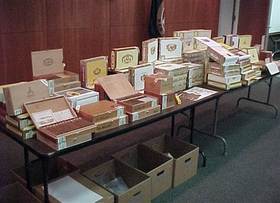 Part of a $20 million load of counterfeit cigars seized in Broward County, Florida in 2006.
Part of a $20 million load of counterfeit cigars seized in Broward County, Florida in 2006. The Danger Of Counterfeit Goods—Especially Cigars
If you buy a fake Rolex, it may break down, and turn your wrist green before that. But you'll probably be okay because you're not ingesting it for crying out loud. The same can't be said for bootleg cigars, which we wouldn't touch with a ten foot pole.
We've heard people say, "Yeah, I know they're fake, but they're not bad. Try one!" These people are idiots. For the same reason we wouldn't take a shot of bootleg NyQuil, we pass on any cigars of questionable origin, Cuban or not. We've seen reports of them containing everything from rat hair to rope and even styrofoam.
Surprised? Why should you be? You're dealing with criminals here. That's what counterfeiters are: criminals. If they cared about integrity and protecting their customers they wouldn't be trying to make money illegally. People who knowingly purchase counterfeit products are enabling them to prosper. So please join us and tell any moron who knowingly buys fakes to by all means smoke up. They deserve what they get, even if it's just a case of the runs, though who knows what smoking styrofoam could mean for someone's long-term health.
The Cardinal Rule
When in doubt, don't buy. Simple as that. Cuban cigars should never come with a "story." If someone tells you they have a cousin in Cuba or they know a guy who knows a guy with an airplane or some such nonsense, RUN. Fast. Unless you're buying vintage cigars from an auction house like Sotheby's where they may have been previously owned by a deceased king or despot, there's only one acceptable answer for where the seller's cigars came from, and that is the local authorized distributor. If you're in England, for example, the only right answer is "I obtain the cigars for my store from Hunters & Frankau."
If you have to be convinced, or feel a need to convince yourself that the cigars you want to buy are real, they're not. The reason is simple. Cuban cigars are only forbidden fruit in one country. Look at it this way: if someone tries to sell you a $4,000 Rolex for $100, you know it's fake. Likewise, if someone told you they got it because their cousin smuggled it out of the Rolex factory, alarm bells would immediately go off. It continues to shock us that so many people refuse to apply the same logic for buying watches or neckties to Cuban cigars. We don't want you to be one of them.
Be safe, use common sense, and enjoy. Purchasing Cuban cigars is no different than buying any other luxury product. Stick to official franchises and authorized dealers and you will be safe, secure and more importantly, not enabling criminals.
If you buy a fake Rolex, it may break down, and turn your wrist green before that. But you'll probably be okay because you're not ingesting it for crying out loud. The same can't be said for bootleg cigars, which we wouldn't touch with a ten foot pole.
We've heard people say, "Yeah, I know they're fake, but they're not bad. Try one!" These people are idiots. For the same reason we wouldn't take a shot of bootleg NyQuil, we pass on any cigars of questionable origin, Cuban or not. We've seen reports of them containing everything from rat hair to rope and even styrofoam.
Surprised? Why should you be? You're dealing with criminals here. That's what counterfeiters are: criminals. If they cared about integrity and protecting their customers they wouldn't be trying to make money illegally. People who knowingly purchase counterfeit products are enabling them to prosper. So please join us and tell any moron who knowingly buys fakes to by all means smoke up. They deserve what they get, even if it's just a case of the runs, though who knows what smoking styrofoam could mean for someone's long-term health.
The Cardinal Rule
When in doubt, don't buy. Simple as that. Cuban cigars should never come with a "story." If someone tells you they have a cousin in Cuba or they know a guy who knows a guy with an airplane or some such nonsense, RUN. Fast. Unless you're buying vintage cigars from an auction house like Sotheby's where they may have been previously owned by a deceased king or despot, there's only one acceptable answer for where the seller's cigars came from, and that is the local authorized distributor. If you're in England, for example, the only right answer is "I obtain the cigars for my store from Hunters & Frankau."
If you have to be convinced, or feel a need to convince yourself that the cigars you want to buy are real, they're not. The reason is simple. Cuban cigars are only forbidden fruit in one country. Look at it this way: if someone tries to sell you a $4,000 Rolex for $100, you know it's fake. Likewise, if someone told you they got it because their cousin smuggled it out of the Rolex factory, alarm bells would immediately go off. It continues to shock us that so many people refuse to apply the same logic for buying watches or neckties to Cuban cigars. We don't want you to be one of them.
Be safe, use common sense, and enjoy. Purchasing Cuban cigars is no different than buying any other luxury product. Stick to official franchises and authorized dealers and you will be safe, secure and more importantly, not enabling criminals.
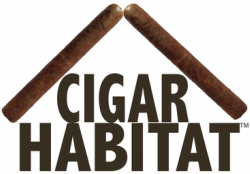
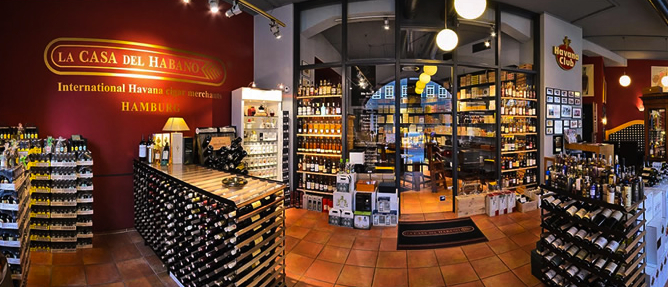

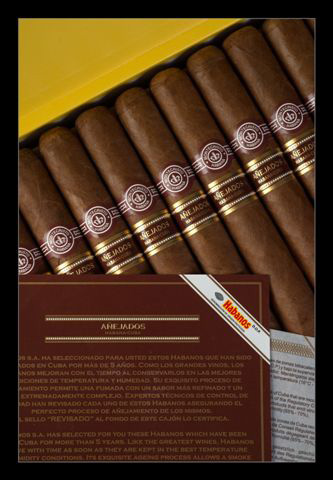
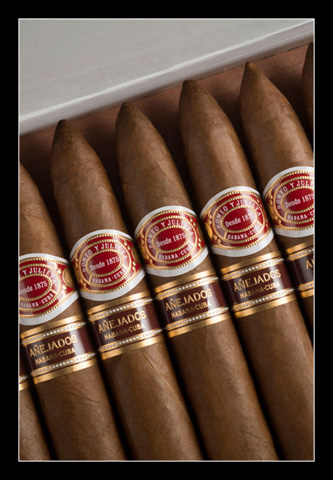
 RSS Feed
RSS Feed
